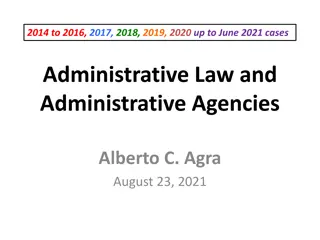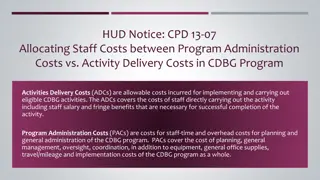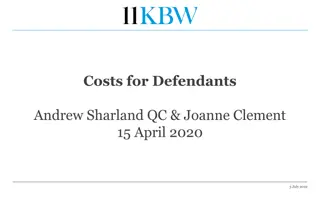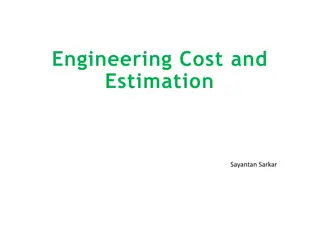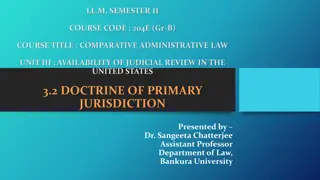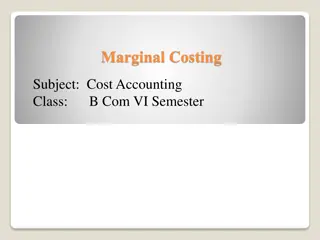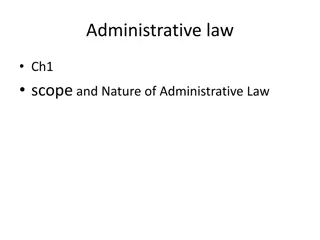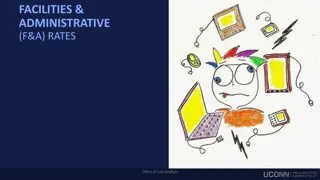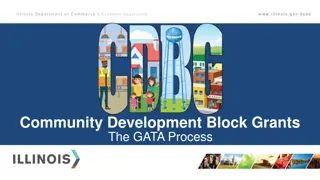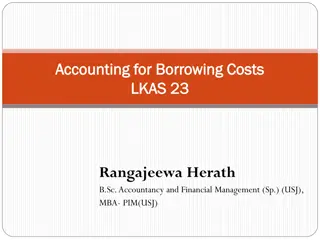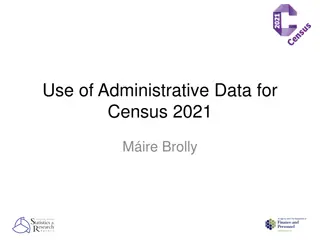Understanding Administrative Costs in Grant Management
Administrative costs are essential for managing grants effectively. Learn about the difference between direct and indirect costs, and why tracking and reporting accurately is crucial to avoid disallowed costs. Explore the definition, classification, and significance of administrative costs in grant programs.
Download Presentation

Please find below an Image/Link to download the presentation.
The content on the website is provided AS IS for your information and personal use only. It may not be sold, licensed, or shared on other websites without obtaining consent from the author. Download presentation by click this link. If you encounter any issues during the download, it is possible that the publisher has removed the file from their server.
E N D
Presentation Transcript
Administrative and Indirect Costs What s the difference?
Overview Define administrative costs. Describe the difference between direct and indirect costs. Describe what an indirect cost rate agreement is and where you go to apply for one. Describe the relationship between administrative costs, program costs, direct costs and indirect costs. Track and report administrative and indirect costs
Why this is important? Failure to track and report costs accurately can lead to disallowed costs. Common Problems: Distinguishing between Administrative and Program Costs Distinguishing between Administrative and Indirect Costs Inappropriate reporting of costs may lead to exceeding limitations
Two Basic Cost Categories Administration Function based Not related to direct program services Can be both direct and indirect Program Activities All grant costs that relate to direct provision of services to participants and employers
Cost Classification Process of assigning costs to benefitting cost objectives Placing costs into some category such as: Administration, Program, Program income, Match or leveraged resources Or some other category as prescribed by statute.
Administrative Costs - Definition 20 CFR 667.220 applies to all grants and programs receiving WIA funds Definition also applies to other grants Allocable portion of necessary and reasonable costs that are not related to direct provision of workforce services
Administrative Functions Accounting, budgeting, financial and cash management Procurement and purchasing Personnel and property management Payroll, audit and general legal services Oversight and monitoring of administrative activities Developing information systems and procedures related to administrative functions
Administrative Cost Limitations Specific to each grant Measured at conclusion of grant period Tracked, accounted for & reported quarterly Includes direct and indirect administrative costs
Administrative or Program? Oversight and monitoring Goods and Services Travel Information Systems *It depends on the nature of function or activity *It is the Job Function NOT the Job Title That Dictates Cost Classification
Administrative Costs The maximum is 5% of the total amount of administrative costs that is allowable, however a waiver may be issued by the RI Department of Education for amounts up to 10%. A copy of the administrative costs waiver must be attached to each grant submission. All administrative costs proposed must be described in the administrative costs description. (State colleges are restricted to 8%).
Direct Cost or Indirect Cost? Direct Costs Cost identified with a specific grant Indirect Costs Cost shared among multiple programs Cost shared among multiple categories Direct and Indirect Costs Can Be Either Administrative or Program
What are indirect costs? (Its easier if we identify direct costs first.) Direct costs Those costs that can be readily identified with a particular cost objective. Examples: (program specific) Salaries program staff Space sq. ft. occupied by direct staff Supplies used by direct staff Communications used by direct staff
What are indirect costs? Those costs which are not readily identifiable with a particular cost objective. Examples: Salaries Executive Director, Accountant, etc. Space sq. ft. occupied by indirect staff Supplies used by indirect staff Communications used by indirect staff
A copy of the signed rate approval, (a fully executed, negotiated agreement), must be attached to the grant application if indirect costs are included in the budget. Cities and towns must have an approved indirect rate from the Rhode Island Department of Education (RIDE). NOTE: Federal Regulations limit the amount of indirect costs that an agency can take on any purchased service (53000 series) to the first $25,000 of the contract. Indirect costs are NOT allowable on state funds
Whats an indirect cost rate agreement? Agreement between a recipient and their cognizant federal agency that specifies the treatment of indirect costs. Ratio between the total indirect expenses and some direct cost base. Based on indirect cost proposal and supporting documentation
Applying for an Indirect Cost Rate Must seek approval within 90 days of grant approval Where? Cognizant Agency (determined based on Fed. Agency providing largest amount of direct Fed. Funds for non-profits; gov t orgs assigned by OMB)
Administrative, Program, Direct and Indirect Costs Complex and inter-connected Not all direct costs are program Not all administrative costs are indirect Not all indirect costs are administrative WIA Admin & Program Costs
Grantee Indirect Costs Example [Approved Indirect Cost Rate of 50%] (hypothetical) Organization-wide Direct Salaries & Wages are $300,000 Total Indirect Costs to be spread to all fund sources are $150,000 AE Grant is $550,000 AE Grant Direct Salary & Wages are $150,000 Indirect Costs Charged to Grant are $75,000
Administrative Costs vs. Indirect Costs (Example contd.) AE Grant is $550,000 Administrative Limit is 10% Grant Administrative Costs are limited to $55,000 (10% x $550,000) Indirect costs chargeable to grant are $75,000
Total Grant Costs All Administrative Costs Both Direct and Indirect PLUS All Program Costs Both Direct and Indirect






